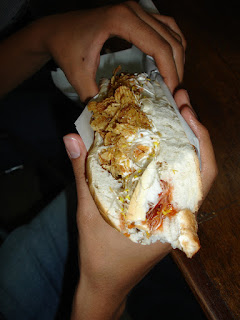Back in May, I had a once-in-a-lifetime (at least for me) opportunity to visit one of the land control stations for the Venezuelan communications satellite, Venesat I. To give a little bit of background, I was in a seminar last semester about space exploration and space programs in an international setting. That is, how different countries and space programs cooperate, share information (or not) and some of the effects these actions have in international relations. Quite frankly, it was one of my favorite classes at the UCV.
Our teacher, Professor Robert Becerra, is probably one of the most intelligent people I know, especially in this area. He has worked in the Venezuelan version of NASA from the time it was just an idea, back in 2002 when it was decided that Venezuela needed to explore the idea of developing and launching its own satellite. Professor Becerra works in the International Relations department of the Agencia Bolivariana de Asuntos Espaciales (ABAE-Bolivarian Agency for Spacial Affairs). He drew upon all of his resources to bring us specialists in different areas of space and space exploration (technology, physics, risk management, history and the development of the Venezuelan satellite program, etc.) to give presentations during class and answer any questions we might have. Every week my knowledge of everything space-related increased exponentially. I will be posting more photos of the last day of class in another entry.


In an effort to give us more of a "hands-on" learning experience, Prof. Becerra took us to BAMARI (Base Aerospacial Capitán Manuel Ríos), a military base in Estado Guarico where one of the control centers for Venesat I is located.


We were given a very warm welcome by the people who work at the satellite station when we arrived and given a tour of the grounds. The only place we weren't allowed to go, the main control room for the satellite, was shown to us via video. We were even allowed to climb up and see the different antennas close up , which made some of us feel like kids again, as seen in the second picture.

Each of the antennas served a different purpose, whether it be send out the signal to shift the satellite's position, access a different signal (like DirecTV or Global Positioning), etc.

After the tour, we headed to the classroom/conference room to continue with a few other activities. However, nature called to some of us and we made a pit stop before going to class. When I went into the bathroom, I was glad that I understood the Spanish part of the sign that told me not to throw the toilet paper in the toilet, because the English part befuddled me.
According to wordreference.com,
| extrude |
| A | verb |
| 1 | extrude, squeeze out
|
| |
| form or shape by forcing through an opening; "extrude steel"
|
I'll leave that for you to try to figure out! It didn't make much sense to me.

In the classroom we listened to a speech by one of the BAMARI/ABAE employees and did other activities, like constructing the satellite below. I somehow managed to finish mine successfully before anyone else (I used scotch tape, they used glue, it doesn't take a rocket scientist to figure out how I got done first!) and got a reward in the form of Venezuelan chocolate- yum!


After the arts and crafts activity, we went to the hallway to participate in a team-building exercise. We were divided into two different teams and had to form a sort of human worm. After we got into position, the two teams raced to the finish while trying not to break the worm. It was truly a group effort, because if one person put in more effort than the person behind him, the worm would break. If a person was slower than the rest, the worm dragged. We were rolling on the floor laughing by the end, and the professor's point about everyone having to do his/her part had been made.

At the end of the day, we were tired yet satisfied with the day's activities. Thanks, Dr. Becerra and ABAE for helping make this day such a success!



















































